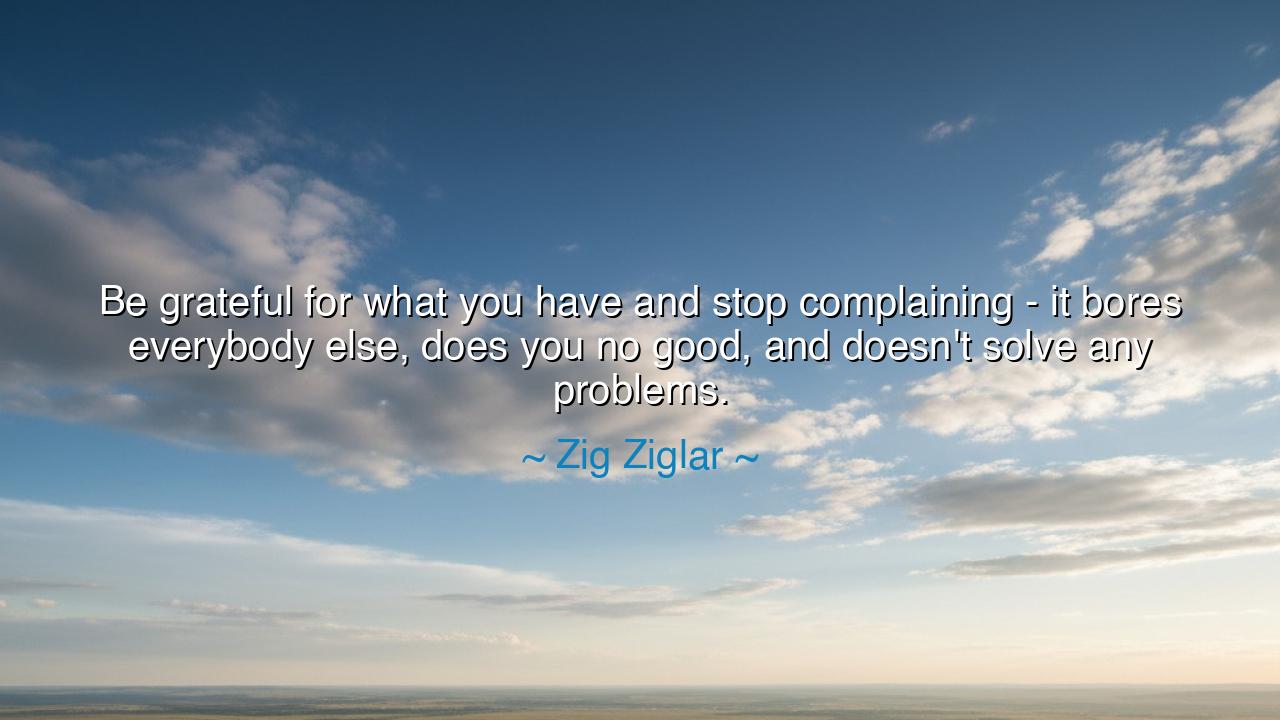
Be grateful for what you have and stop complaining - it bores
Be grateful for what you have and stop complaining - it bores everybody else, does you no good, and doesn't solve any problems.






Hear, O child of the journey, the voice of Zig Ziglar, who in plain yet piercing truth declared: “Be grateful for what you have and stop complaining—it bores everybody else, does you no good, and doesn’t solve any problems.” Though spoken in modern tongue, his words carry the weight of ancient wisdom. They cut through the fog of excuses and self-pity, reminding us that the soul must choose its posture toward life. To complain is to waste the breath of the living, while to be grateful is to harness that breath as a force of creation, hope, and courage.
The ancients knew well the poison of complaint. The Stoics warned that whining at fate only deepens wounds, for it changes nothing except the complainer. The Hebrews wandering in the desert murmured against their lot, though bread fell from heaven and water sprang from the rock; and their constant groaning darkened their journey. So too do we, in this age, forget the blessings within reach while groaning at what is missing. Complaint is not merely idle—it is destructive, corroding joy, driving away companions, and blinding the eyes to opportunity.
Ziglar’s wisdom strikes at this very root: not only does complaining fail to solve any problem, it magnifies the problem within. The heart grows restless, the tongue bitter, the spirit weak. Worse still, it wearies those around us, for none delight in the endless song of misery. What was once a small inconvenience becomes a mountain of despair, carried not because it must be, but because we choose to nurse it with words. Yet the opposite is also true: when we give thanks, even small things become great, and burdens grow lighter.
Consider the story of Booker T. Washington, born into slavery, yet rising to become one of the great educators and leaders of his time. He did not waste his strength on complaining about the cruel beginnings of his life. Instead, he chose gratitude for every opportunity, no matter how small—reading a page, earning an education, teaching others. Through this posture of thankfulness and determination, he turned what could have been a life of bitterness into one of triumph and blessing for generations. His example proves the truth: complaint binds the soul, gratitude sets it free.
So let us see clearly: to be grateful is not to deny hardship, but to anchor oneself in strength. Gratitude transforms the heart into a fountain of energy, courage, and hope. Complaining is passive—it leaves us waiting for rescue that never comes. But gratitude is active—it opens our eyes to the tools we already possess, and with these we carve a new path forward. When the storm rages, the complainer curses the rain; but the grateful soul plants seeds, knowing the storm will water them.
The lesson is plain: abandon the barren fields of complaint. Turn instead to the rich soil of gratitude. For it is gratitude that breeds resilience, joy, and companionship. It lifts the weary spirit and draws others near, for no one tires of a thankful heart. And while complaint adds nothing to our strength, gratitude multiplies it a hundredfold, arming us with courage to face all trials.
Practical actions flow from this truth: each day, speak aloud three things for which you are grateful, no matter how small. When tempted to complain, pause and ask yourself, “Does this serve me? Does it solve anything?” Then turn your thought toward a solution, or toward thanksgiving for what still remains. Surround yourself with those who encourage gratitude, and offer your own spirit as encouragement to others. In doing so, you will find not only your burdens lighter, but your influence stronger.
Thus, remember Ziglar’s call: be grateful for what you have and cast off the weary habit of complaining. For gratitude is the language of strength, while complaint is the voice of weakness. Choose the higher path, and your life will shine like a beacon—lifting yourself, inspiring others, and solving problems not with bitterness, but with the bright power of a thankful heart.






AAdministratorAdministrator
Welcome, honored guests. Please leave a comment, we will respond soon